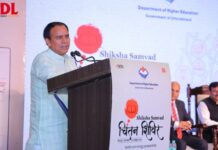The government will spend a staggering Rs.52,057 crore (Rs.520 billion/$11.5 billion) on education and Rs.26,760 crore (Rs.267 billion/$ 6 billion) on health in the year 2011-12 to ensure “inclusive growth” for all, Finance Minister Pranab Mukherjee announced on Monday. “The country has carried for long enough the burden of hunger and malnutrition,” Mukherjee said while presenting his third consecutive budget in the Lok Sabha. Calling education as the tool of empowerment to reap the benefit of India's demographic dividend of a young population, Mukherjee announced a hike of 24 percent in the budget spending for education. “For education, I propose an allocation of Rs.52,057 crore, with an increase of 24 percent over the current year,” Mukherjee said. “Our demographic dividend, a relatively younger population compared to developed countries, is as much of an opportunity as it is a challenge. Over 70 percent of India will be of working age by 2025. In this context universalizing access to secondary education, increasing percentage of our scholars in higher education and providing skills training is necessary,” he said. The allocation for health sector was also increased by 20 percent at Rs.26,760 crore. Calling Rashtriya Swasthya Beema Yojana “an effective instrument for providing health cover to marginal workers”, the finance minister announced extending its ambit to unorganized labor working in hazardous mining and associated industries. Service taxes on air conditioned hospitals with bed capacity over 25 however attracted strong reactions from the private sector. “The budget has levied service tax on hospitals and diagnostic service providers and with this the end user, the patients, will end up paying much more than earlier. This is detrimental to the concept of preventive healthcare and early diagnosis which is pivotal to address the mounting burden of chronic diseases,” said Prathap Reddy, chairman of the Apollo group of hospitals. Chairman & MD, Asian Institute of Medical Sciences N. K. Pandey said, “Union budget 2011 did was somewhat of a disappointment for the healthcare sector. The incentives for Hospitals in districts and towns were missing.” A lack of emphasis on child care in the health budget was highlighted as a shortcoming by some NGOs. “The total health budget has increased by 21 percent. But the budget for the National Rural Health Mission has only increased by 15.5 percent. Given the nearly double digit inflation, this is a nominal increase for a flagship programme that was conceptualized to help India meet the Millennium Development Goals on reducing maternal and child mortality,” Thomas Chandy, CEO, Save the Children said. The hike in education budget was meanwhile welcomed as allocation for both school and higher education increased. “The hike in the allocation under Sarva Shiksha Abhiyan by 40 percent and the revised Vocationalization of Secondary Education scheme are steps in the right direction,” V.K. Gupta, director of Management Development Institute (MDI) in Gurgaon, said. All India Management Association president Gautam Thapar said, “The announcement of support for 'vocationalization' of the secondary education to make Indian youth more employable is very commendable.” Describing education as a means of empowerment, the finance minister also announced a scheme for scholarship for Scheduled Caste and Scheduled Tribe students in Class 9 and 10. “Empowerment flows from education. While the Scheduled Caste and Scheduled Tribe students have access to post-matric (Class 10) scholarship, there was so far a lack of pre-matric scholarship scheme,” Mukherjee said.
Sibal calls for attention on adolescents
Adolescents in the country need immediate attention in terms of their educational needs, Human Resource Development Minster Kapil Sibal said here on Tuesday. “Education is the key to address the problems that our adolescents are facing. Schools play the most crucial role to address these problems, hence teachers are central in reaching out to children,” Sibal said. The minister was addressing the South Asian regional conference on learning and developmental needs of out-of-school adolescents. The event was organized in the capital by Plan India and United Nations Educational, Scientific and Cultural organization (UNESCO). “For out-of-school children, it is important that the teacher training includes mapping of problems of adolescents and addressing them,” added Sibal. Sibal linked technology with the educational needs of children in urban as well as rural areas. “Communication technology will play a big role now as panchayats and schools will be connected with fibre optics. The focus should be on empowering girls, especially because they are excluded at various levels. Education should be able to give them the ability to make choices,” Sibal, also the communications minister, said. The three-day conference that commenced Tuesday will see participation from seven South Asian countries – India, Bangladesh, Pakistan, Nepal, Maldives, Sri Lanka, and Bhutan. “Our aim is to discuss the needs of the adolescents as they are the most difficult group to reach out. Out-of-school adolescents are mostly school drop-outs involved in labour work. They need educational, financial, and health support for holistic development,” said Bhagyashri Dengle, executive director of Plan India, a voluntary organisation. “We will discuss successful models for development to formulate recommendations that will be presented to the planning commission,” added Dengle. South Asian countries, including India, have more than 45 percent of population in the age group of 15-35 years.
Students tense as CBSE exams begin
Doing their last minute revision, anxious students were seen making their way to examination centres across the capital on Tuesday for the start of the Central Board of Secondary Education (CBSE) examinations. Over 1.8 million students are sitting for the board examinations across the country and abroad. This year, 1,061,566 students of Class 10 will appear for Continuous Comprehensive Evaluation (CCE) under the CBSE. As many as 769,929 students will appear for Class 12 board exams. While some Class 12 students appeared for the Physics examination, the Class 10 students appeared for language examination. “I am really tense although I am confident with the topics,” said Aman Mohla, a Class 12 student outside a south Delhi examination centre. “Right now I am having butterflies in my stomach. I guess I will feel confident only after seeing the question paper,” he added. A total of 454,131 boys and 315,798 girls will appear in Class 12 board exams, while the Class 10 exam would be taken by 632,726 boys and 428,840 girls. Parents and teachers accompanying the students tried to calm the jitters and offered some last minute tips. “My son has studied well but was nervous since yesterday (Monday). I have asked him not to worry about marks but try his best,” said Manish Singh, mother of class 12 student. Some residential schools held prayer meetings for students appearing for the board exams. “Before the start of the exams, we hold a prayer meeting in the school and students chant the 'Saraswati Mantra',” said a psychologist-cum-counselor with a residential school in south Delhi. “The teachers also give a pep talk to students to help them overcome stress before the examination,” he added.
British varsity regrets ties with Gaddafi family
The head of the prestigious London School of Economics on Monday said he felt “embarrassed” about the university's ties with the family of Libyan leader Muammar Gaddafi. The LSE director Howard Davies said the decision to accept research funding from a foundation controlled by the Libyan dictator's son, Saif Gaddafi, had “backfired”, the Daily Mail reported. Gaddafi, who is in power since 1969, has been facing mass uprising for more than two weeks. He has also been condemned by the international community for shooting down unarmed protesters. Around 1,000 people have been killed and more than 100,000 have fled the strife-torn country since unrest began on February 14, soon after successful revolts toppled the long-term regimes of neighboring Tunisia and Egypt. Davies, who is also the deputy governor of the Bank of England, said the decision to accept 300,000 pounds from the Gaddafi International Charity and Development Foundation had been debated “extensively” within the LSE. “We looked at the pros and cons of engaging with someone like Saif Gaddafi and with the problems in north Africa and we decided that we would do so,” Davies told the BBC Radio 4 Today programme, according to the Mail. “In retrospect we can say that, knowing what we know now and how he has behaved in this crisis, that's a judgment that we might have made differently,” Davies was quoted as saying. Half of the 300,000 pounds has already been spent on research related to North Africa and the development of democracy and civil society there, the LSE chief said. “I feel embarrassed about it but I don't think the decision was made without due consideration at the time,” he said, adding that all of the money would now be put into a scholarship fund. “I'm not ashamed of what we've done with the money but I do think it's clear that the source of it is not one we want to be associated with, because it is clear that the analysis of Saif Gaddafi which saw him as a modernizing figure in the regime – and I think many governments around the world saw him as such – that does not look to have been a good assessment,” he said. Davies also expressed regret that he visited the country following instruction from then British Prime Minister Tony Blair to advise the regime about how it could modernize its financial institutions. “Clearly now I wish I hadn't done that, but I was asked by the government to do it,” he added.
Class 12, 10 board exams begin today
Over 769,929 students are set to appear in the Class 12 exam of the Central Board of Secondary Education (CBSE) which start on Tuesday, a board official said. The Class 10 Board exams would also begin the same day. Over 1,061,566 students will appear in Class 10 exams, almost 15 percent higher than last year, the official said on Monday. “A total of 454,131 boys and 315,798 girls will be appear in Class 12 board exams, while the Class 10 exam would be taken by 632,726 boys and 428,840 girls,” a CBSE official said.
IIT-Kharagpur welcomes budgetary grant
The Indian Institute of Technology-Kharagpur on Monday welcomed the special budgetary grant of Rs.200 crore ahead of its diamond jubilee, and said the amount will be used for renovation and upgradation of the institution as also in areas like nano science research. “I presume this amount has been sanctioned following our request to the HRD (human resource development) ministry for a major grant. It will help us in renovating various old buildings of the institute which need major renovation,” said A.K. Majumdar, deputy director of IIT-Kharagpur. Finance Minister Pranab Mukherjee, while presenting the budget 2011 on Monday, announced Rs.200 crore as one-time grant to IIT-Kharagpur. “This grant will also help us in renovating and upgrading various laboratories and infusing world class modern technologies into them. It will help our students a lot. The grant will also help us in different segments of high end researches,” Majumdar told the sources. “We need modern technology in nano science area. We welcome this grant as this institution will be celebrating its diamond jubilee this year from August 2011-August 2012,” he added.
DU Institute of Life Long Learning to be decentralised
The Institute of Life Long Learning (ILLL) at the Delhi University (CU) will soon be decentralized, as smaller versions of the learning centre that will be located in 12 colleges are about to be set up. The decentralization of the centre is being seen as a step that will make learning a more interactive process between the students as well as the teachers. The institute currently has only two centres, one each in the north and south campuses. The ILLL was established in the year 2007. Its main purpose is to provide additional study material and tools for students of the Delhi University. It has an online portal that includes e-content for about 12 subjects, such as e-lectures, e-quizzes, e-lessons, e-labs, etc. DU Vice Chancellor Dinesh Singh said that establishing smaller versions of the ILLL in DU colleges would mean utilizing connectivity in all ways, whether it is connecting minds, or institutions. “It will be a two-way learning procedure where students will be giving their inputs on the provision of the learning material,” he said. The 12 colleges where the ILLL centres will be set up are yet to be finalized. These will be chosen on the basis of the competence of the college with respect to information and communication technology along with their ability to provide additional inputs to the institute. The chosen colleges will also be influential in involving the students in the procedure of content creation. The creation of content for several subjects requires manpower and also costs a lot of money. It had been decided that students from computer science will be involved in helping upload the e-content on the portal and will also be paid for it. The ILLL has also planned to upload content on its portals that will be for foreign students, allowing them to obtain a degree from DU online. A step in this direction that has already been taken is by the School of Open Learning that runs a pan-Africa e-network. Students from six countries in Africa can access online lectures in two certificate programmes of the university, accounting and communication skills. The students are awarded DU certificates on completion of these courses.
2 courses in computer application organized for teachers at AMU
The Centre for Promotion of Science at the Aligarh Muslim University (AMU) organized two courses of “Computer Application in Teaching” for teachers from Muslim Managed Educational Institutions and “Introductory Science Course” for teachers from Deeni Madaris. Addressing the valedictory programme, chief guest of the function Prof. A.R. Kidwai emphasized that inclusion of science curricula in all the classes of Madaris, and improvement in science teaching in all the Muslim managed schools is inevitable, which would leave a long lasting impact on the generations to come. Prof. Kidwai also honored the participants with certificates of participation. The Introductory Science Course was coordinated by Dr. G.G.H.A. Shadab of the Department of Zoology, while Dr. Mohammad Tabish of the Department of Biochemistry was the course coordinator for Computer Application in Teaching. The “Introductory Science Course” was planned for the teachers of Deeni Madaris to familiarize them with physical, chemical and biological sciences and to make them realize the significance of science teaching in their institutions. The course was attended by ten participants including female teachers representing Deeni Madaris of Bihar, Gujarat, Madhya Pradesh and Uttar Pradesh. The participants were provided with the opportunity to learn MS Office, MS Excel, MS Power Point, Web Browsing, Multimedia Navigation etc. The resource persons made all efforts to help the teacher participants understand and learn the essential components of computer applications in classroom teaching, data maintenance and handling exam results. Ten delegates including teachers from 24 Parganas (West Bengal), Moradabad, Bijnor and Aligarh attended the course. The participants appreciated the efforts of the centre for motivating them either to introduce science or to improve the methods of science teaching in their institutions, as per modern day requirements. Dr. M. Tabish thanked the guests, participants and resource persons of the courses.
IIM-Calcutta to boost research and upgrade lab
The Indian Institute of Management-Calcutta (IIM-C) plans to utilize the Rs.20 crore special budgetary grant to help students do research in global finance markets and to upgrade its financial research and trading lab. Finance Minister Pranab Mukherjee announced the special grant to the IIM-C in the union budget he presented to the Lok Sabha on Monday. “The money will help us upgrade our financial research and trading laboratory into a world class facility. The fund will also help students for further research in global finance markets,” Ashok Banerjee, professor of finance and head of the lab, said on Monday. The lab was set up on November 18, 2008, to support advanced applied research in financial markets and equip finance managers with the mathematical and conceptual theories. “Lot of money is required for further research in the global finance markets. So, this money will help the students to a large extent,” Banerjee told the sources. “The grant will help us obtain important softwares and global market data. Right now this is going on a small scale. The special allocation will give a boost to our upgradation and research projects,” he said.



















